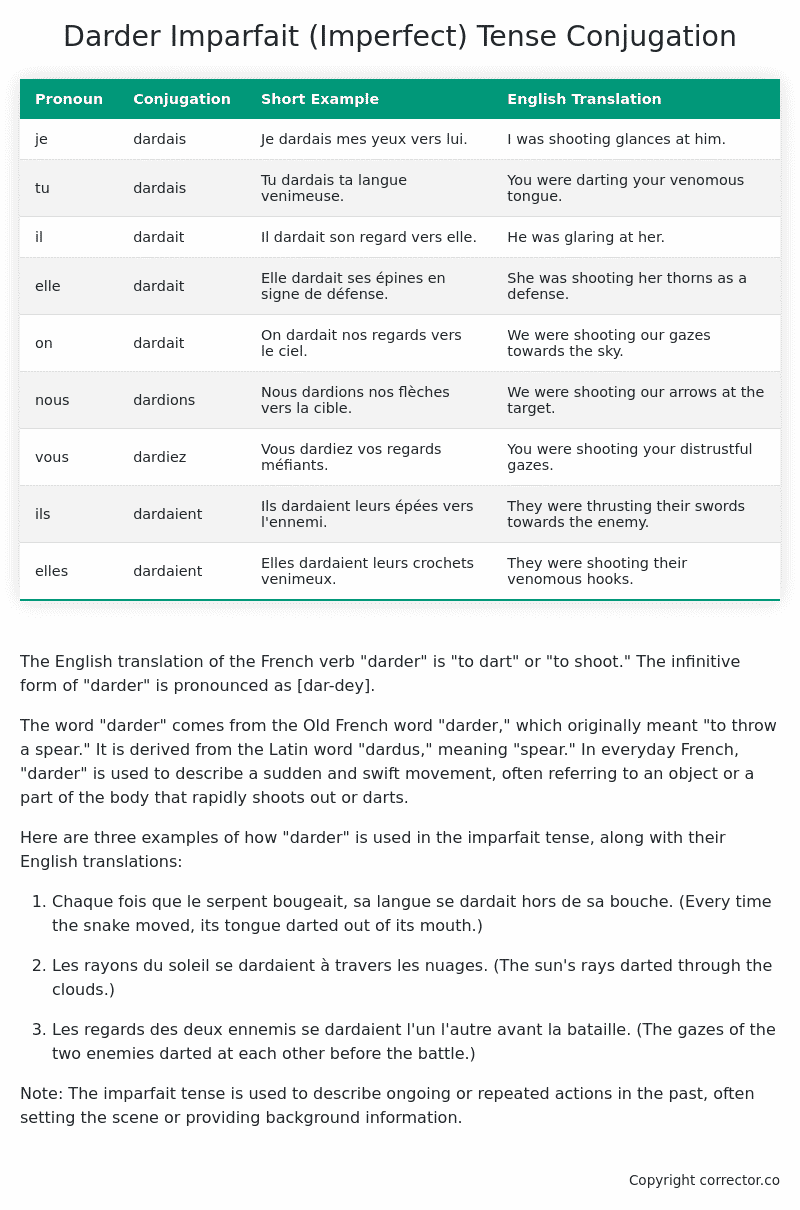Imparfait (Imperfect) Tense Conjugation of the French Verb darder
Introduction to the verb darder
The English translation of the French verb “darder” is “to dart” or “to shoot.” The infinitive form of “darder” is pronounced as [dar-dey].
The word “darder” comes from the Old French word “darder,” which originally meant “to throw a spear.” It is derived from the Latin word “dardus,” meaning “spear.” In everyday French, “darder” is used to describe a sudden and swift movement, often referring to an object or a part of the body that rapidly shoots out or darts.
Here are three examples of how “darder” is used in the imparfait tense, along with their English translations:
-
Chaque fois que le serpent bougeait, sa langue se dardait hors de sa bouche.
(Every time the snake moved, its tongue darted out of its mouth.) -
Les rayons du soleil se dardaient à travers les nuages.
(The sun’s rays darted through the clouds.) -
Les regards des deux ennemis se dardaient l’un l’autre avant la bataille.
(The gazes of the two enemies darted at each other before the battle.)
Note: The imparfait tense is used to describe ongoing or repeated actions in the past, often setting the scene or providing background information.
Table of the Imparfait (Imperfect) Tense Conjugation of darder
| Pronoun | Conjugation | Short Example | English Translation |
|---|---|---|---|
| je | dardais | Je dardais mes yeux vers lui. | I was shooting glances at him. |
| tu | dardais | Tu dardais ta langue venimeuse. | You were darting your venomous tongue. |
| il | dardait | Il dardait son regard vers elle. | He was glaring at her. |
| elle | dardait | Elle dardait ses épines en signe de défense. | She was shooting her thorns as a defense. |
| on | dardait | On dardait nos regards vers le ciel. | We were shooting our gazes towards the sky. |
| nous | dardions | Nous dardions nos flèches vers la cible. | We were shooting our arrows at the target. |
| vous | dardiez | Vous dardiez vos regards méfiants. | You were shooting your distrustful gazes. |
| ils | dardaient | Ils dardaient leurs épées vers l’ennemi. | They were thrusting their swords towards the enemy. |
| elles | dardaient | Elles dardaient leurs crochets venimeux. | They were shooting their venomous hooks. |
Other Conjugations for Darder.
Le Present (Present Tense) Conjugation of the French Verb darder
Imparfait (Imperfect) Tense Conjugation of the French Verb darder (You’re reading it right now!)
Passé Simple (Simple Past) Tense Conjugation of the French Verb darder
Passé Composé (Present Perfect) Tense Conjugation of the French Verb darder
Futur Simple (Simple Future) Tense Conjugation of the French Verb darder
Futur Proche (Near Future) Tense Conjugation of the French Verb darder
Plus-que-parfait (Pluperfect) Tense Conjugation of the French Verb darder
Passé Antérieur (Past Anterior) Tense Conjugation of the French Verb darder
Futur Antérieur (Future Anterior) Tense Conjugation of the French Verb darder
Subjonctif Présent (Subjunctive Present) Tense Conjugation of the French Verb darder
Subjonctif Passé (Subjunctive Past) Tense Conjugation of the French Verb darder
Subjonctif Imparfait (Subjunctive Imperfect) Tense Conjugation of the French Verb darder
Subjonctif Plus-que-parfait (Subjunctive Pluperfect) Tense Conjugation of the French Verb darder
Conditionnel Présent (Conditional Present) Tense Conjugation of the French Verb darder
Conditionnel Passé (Conditional Past) Tense Conjugation of the French Verb darder
Conditionnel Passé II (Conditional Past II) Tense Conjugation of the French Verb darder
L’impératif Présent (Imperative Present) Tense Conjugation of the French Verb darder
L’impératif Passé (Imperative Past) Tense Conjugation of the French Verb darder
L’infinitif Présent (Infinitive Present) Tense Conjugation of the French Verb darder
L’infinitif Passé (Infinitive Past) Tense Conjugation of the French Verb darder
Le Participe Présent (Present Participle) Tense Conjugation of the French Verb darder
Le Participe Passé (Past Participle) Tense Conjugation of the French Verb darder
Struggling with French verbs or the language in general? Why not use our free French Grammar Checker – no registration required!
Get a FREE Download Study Sheet of this Conjugation 🔥
Simply right click the image below, click “save image” and get your free reference for the darder imparfait tense conjugation!

Darder – About the French Imparfait Tense
NOTE: To take a deep dive into all the French tenses then see our article on Mastering French Tense Conjugation.
Formation of the Imparfait Tense
For regular -er verbs:
For regular -ir verbs
For regular -re verbs
Common Everyday Usage Patterns
Description of Past Habits
Background Information
Mental and Emotional States
It’s employed to express emotions, thoughts, or physical sensations in the past. For example: “J’étais content quand il est arrivé.” (I was happy when he arrived.)
Ongoing Actions
Points to Note About the Imparfait Tense
Passé Composé vs. Imparfait
Conditional
Si Clauses
Narration
I hope you enjoyed this article on the verb darder. Still in a learning mood? Check out another TOTALLY random French verb imparfait conjugation!


